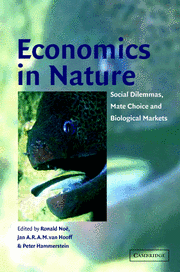Preface
Published online by Cambridge University Press: 04 August 2010
Summary
The constraints of life force every organism to behave economically. The study of economic behaviour is therefore not limited to ‘economics’. Scientific disciplines that concentrate on other aspects of human behaviour, such as psychology, sociology and anthropology, have to pay close attention to the economic decisions that drive human behaviour. The same is true for biological disciplines in which strategic options of individual organisms play a central role, notably ethology, behavioural ecology and evolutionary ecology. In order to determine in how far a behavioural strategy is ‘economical’, it has to be compared to some ideal norm: the strategy that would yield maximum payoff. In economics this norm is set by the strategy of a hypothetical ‘super-rational’ individual. For most of us the term ‘super-rational’ has a connotation of ‘very intelligent’; a strategy achieved by the use of superior cognitive capacities. Evolutionary biologists have realised, however, that even the dimmest of organisms, such as fungi and flatworms, often use ‘super-rational strategies’, because a process of selection running over a vast number of generations can shape the behaviour of every species to near perfection, as long as the circumstances in which it lives change slow enough compared to the rate of evolution. There lies the common ground between biology and economics: while Adam Smith's human producers and consumers are driven by the ‘invisible hand’ of self-interest, Charles Darwin's living organisms are driven by the selection for maximising individual fitness.
The present volume gives a number of examples of the common grounds on which economics, biology and the social sciences meet.
- Type
- Chapter
- Information
- Economics in NatureSocial Dilemmas, Mate Choice and Biological Markets, pp. ix - xPublisher: Cambridge University PressPrint publication year: 2001

